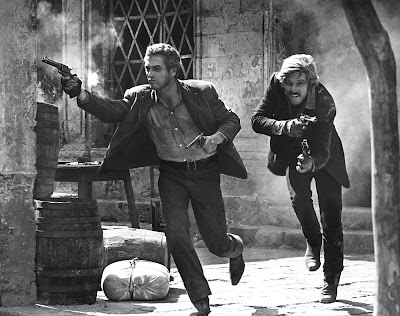 Butch Cassidy and the Sundance Kid isn't your basic western. They're not patrolling the west killing Injuns and protecting homesteaders. They're robbers. They rob trains and banks, cavort at cat houses and practically share a local school mom, but people still love the hell out of them. Except for H.E. Hariman of the Union-Pacific railroad who puts together a "super posse" to eliminate Butch and Sundance because they are constantly robbing his trains. What ensues in the middle of the film is one of the greatest chases minus automobiles in film. Eventually the pair escape from their pursuers and wind up in Bolivia with the school teacher walking a tightrope between going straight and continuing their thievery.
Butch Cassidy and the Sundance Kid isn't your basic western. They're not patrolling the west killing Injuns and protecting homesteaders. They're robbers. They rob trains and banks, cavort at cat houses and practically share a local school mom, but people still love the hell out of them. Except for H.E. Hariman of the Union-Pacific railroad who puts together a "super posse" to eliminate Butch and Sundance because they are constantly robbing his trains. What ensues in the middle of the film is one of the greatest chases minus automobiles in film. Eventually the pair escape from their pursuers and wind up in Bolivia with the school teacher walking a tightrope between going straight and continuing their thievery.Paul Newman is Butch Cassidy and plays him as the likable guy that most of Newman's roles turn out to be. He plays Butch not as a wisecracking good old boy, but a cynical guy trying to find the bigger and better deal. Newman fills the role perfectly and creates another trademark persona to his long resume. A young Robert Redford plays Sundance, who is deadly with a gun and seems cold to the world when the situation calls for it, but is just as cynical as Butch in private. Redford balances the need to over act or under act as the script calls for by keeping everything in tune with a performance that is smooth throughout the film. Katharine Ross is the glue that holds the boys together as Etta Place, the school teacher the two almost share between each other. Butch is like an older brother and Sundance is her love, though sometimes the roles seem a little blurry. Ross tends to be stiff at certain points in the film but it doesn't take away from the performance or the film as a whole.
Directed by George Roy Hill, who would garner an Oscar a few years later for pairing Redford and Newman up again in The Sting, gives us a film that honors the westerns that come before it (especially John Ford during the super posse chase) but builds the film into something that the world had not really seen before: the buddy movie. All of those buddy films that filed past the following forty years can tip their hats to Butch and Sundance, just as this film can slightly tip its hate to the Hope and Crosby road pictures from 20 years before it. The film benefits from George Roy Hill not making a straight bio-pic and going with this route and turns what would have been a rank in file film into something extraordinary.
Butch and Sundance is one of those classic films that not only benefits from its substance, but it also gains more momentum from the era that it was released. Rebels were a hot commodity in the year that Woodstock happened and anti-authority movies were what was selling (consider a year later that George S. Patton would be called the first rebel and win an Oscar for George C. Scott). Beyond that, Butch and Sundance gives us two great actors at their best in the leads and a finely constructed film that remains a classic and ironically a favorite for many people who don't even care for westerns.
No comments:
Post a Comment